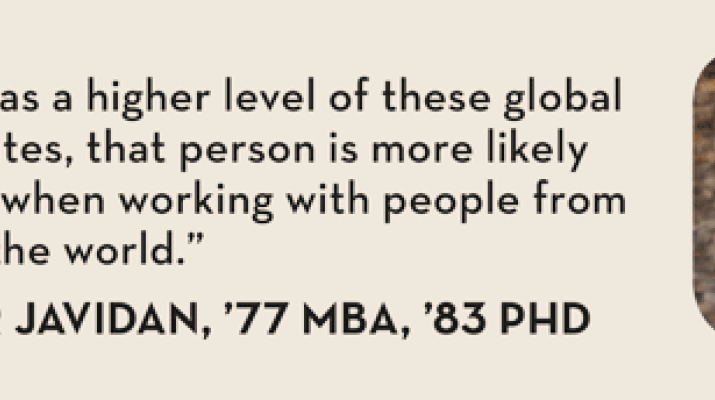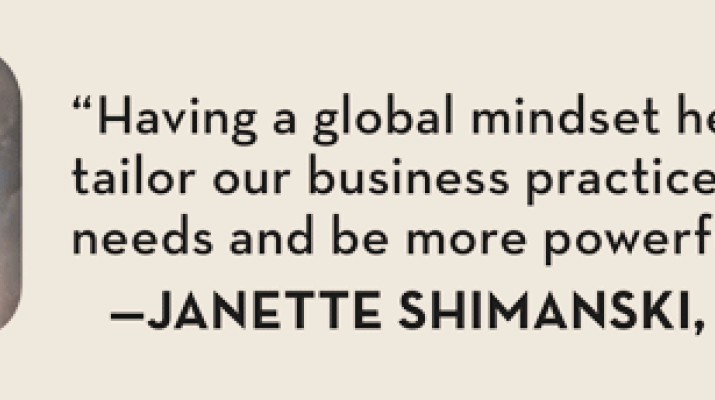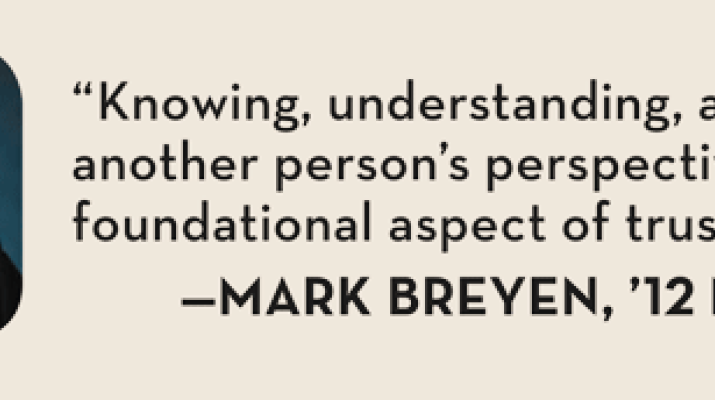
The New Global Landscape and a Mindset to Match
Tuesday, April 1, 2014
By Bridget Aymar
Alumnus Identifies Skillset Essentials for International Business Success
Organizations are looking to international markets to forge fresh partnerships, reach new customers, and develop innovative products. As businesses grow their global reach, employees must collaborate across international borders and uncover subtle differences among diverse populations. By navigating differing cultures, languages, and customs, business leaders with a particular skillset will thrive.

"If a manager has a higher level of these global mindset attributes, that person is more likely to be effective when working with people from other parts of the world."
Alumnus Mansour Javidan, ’77 MBA, ’83 PhD, is director of the Najafi Global Mindset Institute at the Thunderbird School of Global Management in Arizona. The author, professor, consultant, and researcher studies the dynamics of international business. Based on decades of data, Javidan devised the Global Mindset Inventory, an assessment that measures the set of characteristics that help global leaders better influence individuals, groups, and organizations unlike themselves.
According to Javidan, a strong global mindset is instrumental for success in the global business landscape.
“If a manager has a higher level of these global mindset attributes, that person is more likely to be effective when working with people from other parts of the world,” says Javidan. “Inversely, employees with low levels of these attributes are more likely to get frustrated and find obstacles when they have to work across international boundaries.”
A Skillset for International Collaboration
Javidan posits that those who possess intellectual, psychological, and social capital—the dimensions that form a global mindset—will work most effectively with collaborators from other parts of the world.
Intellectual capital concerns how effectively an employee can leverage information about different regions of the world (regulations, governments, competitors, economic conditions, etc.) to make decisions. Professionals with a high degree of intellectual capital possess strong global business savvy.
Psychological capital speaks to an employee’s attitude toward the unfamiliar nature of international business. Professionals with an abundance of psychological capital display a passion for interacting with diverse individuals and customs, along with a knack for solving problems in unpredictable and complex environments.
Social capital is a measure of an employee’s emotional competency. Employees with ample social capital can easily connect with people from other parts of the world. They work effectively with diverse teammates and bring divergent views together.
If observed in action, professionals who thrive in international roles demonstrate a strong capacity along all three global mindset dimensions.

"Having a global mindset helps us to tailor our business practices to various needs and to be more powerful overall."
Detecting Then Catering to Local Needs
Janette Shimanski, ’91 PhD, is vice president of 3M Marketing Excellence. As part of her role shaping international marketing strategy, she visits 15 to 25 countries per year to engage with customers, learn about their cultures, and introduce 3M innovation to communities across the globe.
“A global mindset is more than thinking about one country, one application at a time, although needs can continue to be local in some cases,” she says. “We also don’t want to take one overarching approach for an entire global strategy. The goal is to identify common patterns and needs and find the right balance of global leverage and local fit.”
Shimanski leverages her skills along each of the dimensions of the global mindset to identify opportunities specific to the needs of each country or community where 3M does business. And for a corporation that credits roughly two-thirds of its revenue to international business, the skillset is essential.
“Having a global mindset helps us to tailor our business practices to various needs and be more powerful overall,” she says.

"Knowing, understanding, and valuing another person's perspective is a foundational aspect of trust."
Finding Commonalities to Build Trust
Mark Breyen, ’12 MBA, is senior director of Core Technologies at Medtronic, Inc., the largest medical technology company in the world. He collaborates with research and development partners in China, Japan, and across Europe. According to Breyen, global partnerships revolve around each party’s ability to establish common ground to build trust.
“Knowing, understanding, and valuing another person’s perspective is a foundational aspect of trust,” he says. “How you build that trust can vary from culture to culture, but if you dig deeper, there are common threads among us all.”
In applying social capital to collaborate with diverse teammates, Breyen makes the most of his global connections. “By developing and leveraging these skill sets among a growing number of employees and global partners, Medtronic can further its mission of developing innovative therapies to alleviate pain, restore health, and extend life for millions of people all over the world,” he says.
Global Matters Illuminates International Business
Javidan shared his expertise with hundreds of Minnesota professionals in November at the inaugural Global Matters speaker series, hosted by the Carlson Global Institute (CGI). The series, designed to enrich Minnesota professionals’ global business acumen, features speakers at the forefront of global business who share their expertise in emerging issues in international business and management. Visit CGI’s website for details on the next Global Matters event.
How to Strengthen Your Global Mindset
Mansour Javidan says the best way to cultivate a global mindset is to travel the world. But for those who receive few opportunities to explore the globe, Javidan shares the following tips for strengthening a global mindset:
Follow international news:
Stay abreast of political, economic, and social issues taking place in many parts of the world.
Tour other countries from afar:
Explore the world through things you are already passionate about. Dine in local ethnic restaurants or attend a sporting or music event that is popular in a culture that interests you.
Diversify your circle of contacts:
Whether you get a coffee with a colleague from down the hall, or connect on LinkedIn with a professional abroad, grow your network of multicultural contacts. Thanks to social media, it’s never been easier to forge ties with people from diverse backgrounds.
Assess your own perspectives:
Understand your own cultural perspective and how it compares to other cultures by taking a cross-cultural assessment.
Develop specific cultural knowledge of a region:
Study a language and watch or read popular media in other cultures to see how people think and interact with one another.